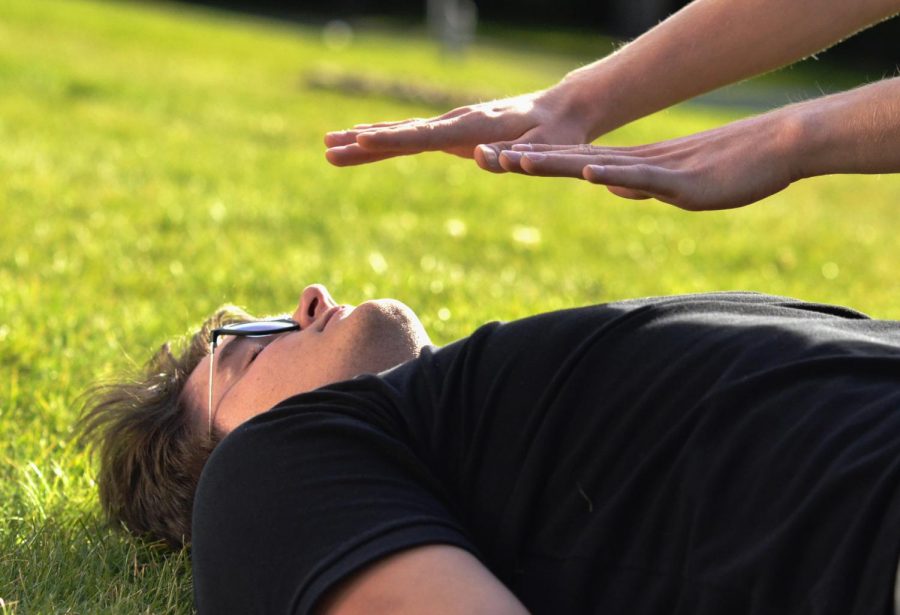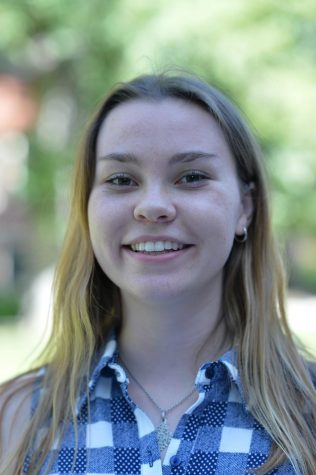Energetic medicine combines holistic techniques
Reiki, acupuncture stem from other cultures, need context to understand
PAIGE CAMPBELL | EVERGREEN PHOTO ILLUSTRATION
“Some practitioners will feel energy, some people will see it, some people will hear it,” said Kraig Brown, owner of SAM’s Apothecary. Brown said he feels a certain “fuzziness” when around areas of tension on others’ bodies.
September 26, 2018
SAM’s Apothecary in downtown Pullman is, essentially, a folk pharmacy. Owner Kraig Brown sells his products for their unearthly qualities. He believes in energetic healing powers in crystals, essential oils and people.
Once a full-time EMT, Brown said he is a healer at heart. His apothecary doubles as a location for his reiki practice.
Reiki, Brown said, is an energetic healing method developed from Japanese ideas about energy. During a session, a practitioner works with ki — similar to Chinese qi — which Brown describes as universal energy.
Brown said many practitioners start a session by “working with energies” around the person from several feet away. Then, they will use a “laying of the hands” technique to gently touch the body in one spot in order to move healing energy to that area.
Reiki is not the only energetic medicine on the Palouse. Acupuncture also uses a similar spiritual belief system.
Laura Rose Lambert, a local acupuncturist and classical Chinese medicine practitioner, said acupuncture addresses energy as “qi.”
“Chinese medicine is energetic,” Lambert said. “We use the needles as a tool to manipulate qi.”
Acupuncture has become more mainstream, but the concept of energy that is at the heart of Chinese medicine might not be apparent to an acupuncturist’s client. While all acupuncturists are trained to manipulate energy, Lambert said there are some who don’t have a feel for it.
A more clinical acupuncturist, she said, might follow body charts labeling energetic points very closely, whereas a more “woo-woo” acupuncturist will sense the energies intuitively.
Brown’s reiki practice is almost completely intuitive. Brown said he doesn’t focus on charted points, or even the chakra system. He responds to the energy he feels in clients.
“Some practitioners will feel energy, some people will see it, some people will hear it,” Brown said. “I feel it.”
To demonstrate, Brown asked if I was experiencing any aches or pains. I was. He asked me not to tell him where my pains were. Then, he moved his hands around me, about 6 inches away from my body, and after a moment touched four main points of tension and achiness.
I was shocked by his accuracy and precision. He explained how it felt to sense my areas of pain.
“To me, [your aches] felt just fuzzy, just different,” Brown said. “That’s how I feel it.”
He said that, depending on the person, he might sense “fuzziness” like he did around my body, or he might feel a temperature difference or even a twinge of pain around an area.
When he feels a fuzzy spot during a reiki session, Brown said he takes a moment to keep his hands in the area and funnels energy in from around him.
“I channel energy,” he said. “I’m pulling in energy — the energy that’s everywhere all around us, universal energy — and I’m pushing it out of my hands. And then it does what it needs to, to heal.”
Brown said essentially, the body heals itself. The energy allows the body to balance out and self-heal holistically — which Brown described as mentally, physically and spiritually.
All of this discussion of energy healing can feel bizarre to those of us who are primarily exposed to Western medicine. Although reiki deals in healing, as do medical doctors, it is a spiritual practice based primarily on tradition, while Western medicine is based primarily on empirical study.
Julia Cassaniti is a professor of psychological anthropology at WSU. She is the author of the book “Remembering the Present,” which is about the psychology of Buddhism in Asia. Her work focuses on religious experience in different cultures.
“A lot of religious cultural practices are based on beliefs that are not necessarily empirically grounded,” she said. “Anthropologically, regardless of whether things are true, they truly have real effects in people’s lives and behaviors. And that’s what makes them important to look at.”
Cassaniti also said it’s important to think about practices like reiki in a global context.
“If we’re looking at these as ‘alternative practices,’ we want to think about questioning that,” she said. “Alternative to what? To what norm? In fact some of these practices are quite normative and common in lots of places around the world.”
Linda Kingsbury, holistic nutritionist and owner of Spirit Herbs in Moscow, trained Brown in reiki healing. She said in the world of holistic healing, reiki isn’t unusual at all.
“Reiki is just another form of vibrational healing that comes from a Japanese tradition,” Kingsbury said. “A lot of vibrational and energy medicine work along the same lines. The practices came from different parts of the world, but work with the same energy.”
Lambert shared Kingsbury’s sentiment. Nearly repeating what Kingsbury said, she added that reiki falls under the umbrella of energetic medicine.
“We’re all using the same system that Western medicine doesn’t understand,” Lambert said.
Lambert said she has received reiki treatments from Brown, and Brown gets acupuncture treatments from Lambert. She said the two love to discuss their energy work together. Connections like these work to build a specific Palouse perspective on energy work.
Cassaniti said any healing practices are uniquely molded by local needs. Even if Brown’s reiki doesn’t exactly match original Japanese styles, it’s valuable to the people of the area in its own right.
“It’s important to recognize that every practice is culturally and historically situated,” Cassaniti said. “A practice like reiki both has a long history in different traditions and can be relevant for people today in this context because of their own cultural concerns and interests that are particular to this area.”
In Pullman, Brown said stress is the health problem he addresses most with clients. He believes it is vital that people learn to self-heal and address their stress.
“It doesn’t matter what you do or where you work, you have to be able to take care of yourself,” Brown said. “If you don’t know how to do that, that’s something we can talk about.”










